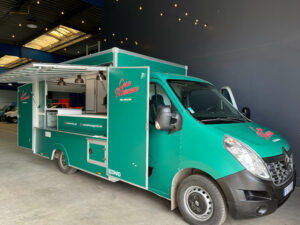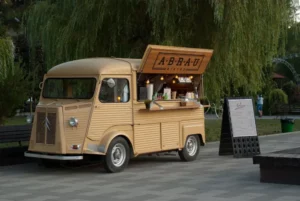Reading guide
To operate as an itinerant merchant in France, you may need to hold a “carte de commerce ambulant” (itinerant trade card) and obtain public domain occupancy permits in order to comply with current regulations and operate your business.
Hold an itinerant trade card
To operate a travelling sales business in France, it is essential to comply with certain regulatory requirements.
Who needs an itinerant trade card?
The “carte de commerçant ambulant” (itinerant merchant’s card) is compulsory for all non-sedentary professionals, whether craftsmen, shopkeepers or micro-entrepreneurs,who travel outside their commune of professional domicile to exercise their activity.
This obligation also applies to professionals with fixed business premises, but who make part of their sales on themove .
On the other hand, if the activity is limited to the commune where the company isdomiciled , or if the trader goes to his customers’ homes, as is the case for certain trades such as bread or grocery rounds in rural areas, home repairers or sales representatives, he is not required to hold it.
How do I obtain an itinerant trade card?
The application must be sent to Centre de Formalité des Entreprises (CFE):
- Chamber of Commerce and Industry (CCI) for retailers
- The Chambre des Métiers et de l’Artisanat (CMA) for a craftsman
This online procedure requires you to fill in the Cerfa n°14022*02 form and send it to the appropriate CFE.
What are the penalties for non-compliance?
The absence of an itinerant trade card when one is required constitutes a infraction punishable by a fine for a 3rd class contravention. The maximum fine for a 3rd class contravention is €450 for a natural person, and €3,000 for a legal entity.
In addition, the itinerant merchant card does not exempt you from obtaining the other authorizations required to sell on the public highway.
Authorization to occupy the public domain
Itinerant merchants must obtain a valid authorization to occupy the public domain in order to operate on the public highway. This authorization takes the form of a decree, for which the contractor pays a fee.
Different types of authorization for different situations
To obtain a site at a market, fair or funfair, you need to contact the local town hall or the event organizer, and pay the following fees while a permission de voirie is required to set up a ground-mounted kiosk or enclosed terrace on the communal public domain. If you wish to occupy a site without a fixed footprint, for example with a food truck, a stall or an open terrace, you will need to obtain permission from the Town Hall. request for a parking permit must be issued by the town hall or the prefecture.
Supporting documents
A number of supporting documents are generally required to complete the authorization application file:
- Proof of identity
- K-bis extract less than 3 months old
- A description of the business (dimensions, photos, etc.)
- A photograph of the desired location
- A certificate of professional insurance
- A copy of your itinerant trade card
This occupancy permit is always temporary and revocable; it is granted for a fixed period and may be withdrawn at any time by the authorities if necessary, notably for reasons of public interest. Furthermore, this authorization is personal and may not be transferred or sold, even in the event of transfer of the business.
What regulations apply to food trucks and itinerant catering?
If you’re planning to set up a food truck, you need to understand the regulations that apply to this activity. Visit Hygiene and safety standards are particularly strict in the food sector, and must be scrupulously complied with to guarantee consumer health and avoid any risk of sanctions.
Compliance with health and safety standards
Food trucks are subject to the same hygiene and food safety regulations as traditional catering operations, which means that they must scrupulously comply with the cold chain for perishable foodstuffs, maintain anirreproachable cleanliness in the vehicle and equipment, ensure proper conservation of foodstuffs (use-by dates, appropriate storage, etc.) and train staff in good food hygiene practices (HACCP method).
In fact, HACCP (Hazard Analysis Critical Control Point) training is mandatory for all food industry professionals, including food truck operators, as it helps to control health risks and guarantee food safety.
Sanitary approval for animal products
For establishments producing, processing, handling or transporting products of animal origin without direct sale to consumers, such as a food truck serving meat dishes or other products of animal origin (charcuterie, cheeses, etc.), a request for approval must be submitted to the Direction Départementale chargé de la Protection des Populations (DDPP) or the Direction Départementale de l’Emploi, du Travail, des Solidarités et de la Protection des Populations (DDETSPP).
Sanitary approval guarantees that the establishment complies with current hygiene and food safety standards, and is issued following inspection of premises, equipment and procedures.
Mandatory information for pre-packaged products
If you sell pre-prepared and packaged food products (sandwiches, salads, desserts, etc.), you are required to clearly indicate on the packaging:
- The best-before date (BBD) of the product
- Presence ofallergens (gluten, peanuts, milk, etc.)
- List of ingredients
This information enables customers to make informed choices and avoid the risk of food poisoning or allergic reactions.
Finally, what kind of authorizations are needed for itinerant trade?
To operate as an itinerant merchant in France, you need to obtain a carte de commerçant ambulant (itinerant merchant’s card), mandatory for non-sedentary professionals moving outside their commune of residence. In addition to this card, a A permit to occupy the public domain, issued by the town hall in the form of a municipal by-law or parking permit, is required to sell on the public highway. Food trucks must comply with hygiene standards and food safety, training staff in good hygiene practices, and obtaining a sanitary approval for animal products. Failure to comply with these obligations may result in penalties, including fines (3rd class contraventions).
Need more information?
Questions about your new truck?
Our team is there for you! We’ll answer all your questions and guide you every step of the way. Contact us today:
Our food trucks and store trucks
Our food trucks
Pizza truck - Snack truck - Chip truck - Creperie truck - Sushi truck - Thai truck - Catering truck - etc.
Our store trucks
Hairdresser truck - Grooming truck - Event truck - Mobile office - Advertising truck - Tattler truck - etc.
These articles may be of interest to you

Food truck layout process
Setting up a food truck requires careful organization and compliance with certain standards. To transform your truck into a real mobile restaurant, you’ll need to

Food truck layout process
Setting up a food truck requires careful organization and compliance with certain standards. To transform your truck into a real mobile restaurant, you’ll need to

Food truck layout process
Setting up a food truck requires careful organization and compliance with certain standards. To transform your truck into a real mobile restaurant, you’ll need to